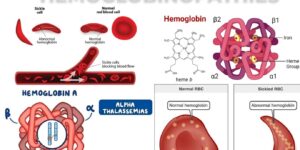Theofilou P, Nikolakopoulos S. Quality of life among patients with hemoglobinopathies: the role of self-efficacy in the use of medication and satisfaction with the provided health care. Series Clin Med Case Rep Rev. 2025;3(3):1-17.
Background: Hemoglobinopathies are chronic diseases that significantly burden patients both in their daily lives and in the long term. The purpose of the research is to contribute to the understanding of patients’ experiences, needs and perceptions regarding the medical services provided. The research aims to highlight the positive and negative dimensions of healthcare, as well as to enhance self-efficacy in medication use and empower patients to use medications appropriately.
Methods: The research is based on a sample of 130 patients with diagnosed hemoglobinopathy, coming from three different hospitals in Greece. Data were collected through a structured questionnaire, which includes four main sections: satisfaction with healthcare (PSQ-18), self-efficacy in medication use (SEAMS), quality of life (QOL10), and demographic/clinical data of the participants.
Results: The research findings indicate that quality of Life (overall) presents a negative correlation (r = -0.358, p < 0.001), indicating that higher levels of self-efficacy in medication use may be associated with lower perceived quality of life. Also, general Quality of Life is negatively correlated (r = -0.372, p < 0.001), possibly indicating that self-efficacy in medication use affects the overall sense of well-being and health. Overall, self-efficacy does not appear to be significantly related to any of the Satisfaction subscales. Self-Efficacy in Medication Use and Overall Satisfaction with Overall Satisfaction, Self-Efficacy in Medication Use shows a non-significant correlation (r = -0.019, p = 0.827).
Conclusion: The findings show a strong association of quality of life with self-efficacy in the use of medication.

